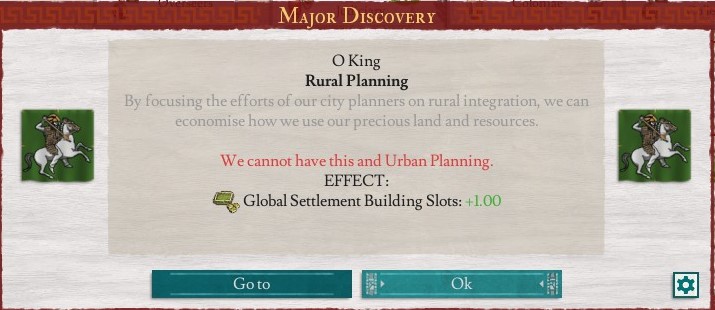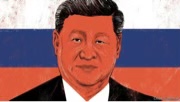|
7: A Northern Crown The conquest and subjugation of the Hellenic peninsular - a task brought to near completion by King Atuyyca - had delighted and concerned the traditional Scythian nobility in equal measure. From their hunting grounds in the north they looked with growing concern at the increasing Hellenizing tendencies displayed by the Scythian royalty, and saw a threat to their power. Things came to a head when King Atuyyca employed Plutarch, a young Greek scribe from Delphi to assist him in drawing up a new code of rights and privileges for the cities of the realm. Cities, according to the nobles, merely traded off the goods made in the countryside - in their countryside. Instead, the public purse should go towards improving farms, mines and hunting, so that ‘true Scythians’ may benefit.  It should not be assumed, however, that the traditional nobility were altogether reactionary - some hellenic habits they were most appreciative of. Writing had much to offer for the protection for their traditional rights. In particular, the Bara Atuyyca - the Atuyycan Codex - codified many traditional Scythian laws around their succession and the rights of their chiefs. Most notably, the ‘Thagi-Bajzæyat’ - the “Children of the Mighty” - (the Royal Scythians claimed descent from a particular horse-taming demigod, we can recognise them here attempting to exclude other Scythian groups of lesser provenance, such as the Sarmatians, from the highest ranks of the nobility) were recognised as the group with the exclusive right to elect new kings, and their property was to pass to their sons - or, in a strong repudiation of hellenic customs, their daughters ‘as they may see fit and according to their most venerable customs’.  With the attention of the realm focused on the North, convincing the chiefs to embark on a conquest of the Aegean was no mean feat. Plutarch's dismissal and self-exile to lead the Academy in Athens had clearly deeply wounded Atuyyca, and it has been suggested that his conquest of the remaining hellenic statelets (apart from Pergammon and Crete) was in retribution for Plutarch’s claim that the Scythian conquest of Hellas had been ordained ‘that Hellenes should spread to all corners of the world to carry the light of wisdom’ - the first recorded incident in the development of a pan-hellenic identity in the diaspora. Indeed, Plutarch would do much in his lifetime to develop the Platonic tradition into a true philosophical-religious movement which could stand in (limited) opposition to the ‘Christian’ movement sweeping Thessalonica and Korinthos.  The chiefs, however, cared little for any such psychodrama - provided the hellenes paid their taxes, any proto-hellenism from them was a sideshow at best. Their main concern was that once again the south was sucking men, time and money down its seemingly endless gullet. It was only by appealing to the ever-present scourge of piracy that Atuyyca was able to convince them of the necessity of a new fleet.   Such an strong stance against piracy traveled far beyond its intended audience - once Atuyyca had concluded his war in the Aegean, he found that both Dacia and Galatia had interpreted his words as a unilateral promise to protect their merchants abroad, rather than the former bilateral relationship they had enjoyed. Wusun, meanwhile, had pledged service for such ‘protection’ and offered their full host at his disposal.    To the Thagi-Bajzæyat, this was a stroke of good fortune - Scythia, or so they claimed, would only have to intervene should members of the former Triumvirate face oppression or warfare which they had not brought about - the king was no under no obligation, for instance, to intervene in the Celtic war against the Selucids. Instead, his focus could remain in the north. Correspondingly, they became more willing to offer their bondsmen in war, being less concerned about them being ‘frittered away’ in the south.  In particular, the growing power of the Kushan in the East brought them worry. Liege to half a dozen, if not more, clans and tribes, the Kushan were beginning to monopolize the trading routes which had historically plied the caravan route to Daqin. Should all the tribes march as one ,their warhost would the terror of all civilised lands. Indeed, before the Thracian hosts arrived, Scythia found itself locally outmatched and outclassed for the first time since the first Aegyptian war a half-century prior, and King Atuyyca was mortally wounded in a haphazard retreat.   While eventually the Scythian numerical advantage eventually ground a limited victory, paid for dearly in blood and gristle, the Thagi-Bajzæyat took this as further proof that more decisive action was needed on the Eastern front to short up the Scythian borders. Similarly, the Wusun were resettled up the Tyras to shore up the western border of the empire against the Germanic migrants on the north-west plains. Scythia saw a succession of elderly kings during this time - all Thagi-Bajzæyat of the most venerable caliber, and all, frankly, well past any attempts at serious governorship. To placate the younger, more philohellenic generation the capital was expanded and a grand shrine to Tabiti, the ur-flame, was consecrated in Pella. Despite all this, Scythia was clearly a state which was turning ever more inwards.    This all changed with the arrival of a ship in Pella. Flying the a miscoloured emblem which matched those of ships which hailed from the grand cothon of Carthage, it was at first assumed that it was a merchant who had perhaps foolishly sworn for a pretender to the Sufetship. And indeed, when he asked for amber and silver fit for a new king, it was presumed apparent what his mission was. Just how much the world had passed the Scythian nobility by as they idled and warred in the north was clear when he explained his actual mission. “I come from Abbar II, Adonis of Phoenicia” he said. “He sends me to bring tidings and congratulations to the king of Aeduia, the Sufet of the Gauls.”   The world in 76 CE:  Fun facts: the Sufet of Carthage is culturally basque (vasconian) and worships the old numidian megalithic pantheon, hence the (pink) revolt. This won’t change the culture and religion of Carthage - it’s much more like having a heretic foreigner on the throne in EU than have one in CK. The south of the isle of the britons has been invaded by the Belgae, fleeing the Gaulish hegemony over the continent. In the future, kings of those lands will likely title themselves kings of the Belgae, and their lands will be the kingdom of Belgium. Question for the chiefs: how to handle the Academy at Athens? It’s currently a center of hellenic scholarship and learning, but seems to be giving our hellenes ideas above their station. We can either continue to tolerate their philosophy and rhetoric, co-opting it as it seems useful to us, or suppress the school and banish the scholars to distant lands. Note: neither choice will affect us in-game, but will shape the hellenic identity in the diaspora - suppression and banishment will likely result in a learned, literate hellenic diaspora throughout the mediterranean, finding employment as scholars and scribes, merchants and moneylenders, whereas toleration is likely to lead to a synthesis of greek thought with new theologies.
|
|
|
|

|
| # ? Jun 7, 2024 17:47 |
|
Toleration They give us peace and tribute and we allow them their ways.
|
|
|
|
Toleration Those are our ideas now.
|
|
|
|
Toleration If they're our Greeks then they're our ideas
|
|
|
|
Oh boy, an imperator rome game. Glad I could catch it on the ground up. Tolerate their goofy ideas.
|
|
|
|
Tolerate. It all seems harmless enough to me.
|
|
|
|
Yuiiut posted:
LESGOOOOOOOO EUSKADIA ASCENDANT WOOOOOOOO
|
|
|
|
Suppress because I think that outcome is more interesting
|
|
|
|
Toleration
|
|
|
|
Tolerate
|
|
|
|
Toleration, because that surely can't go wrong.
|
|
|
|
Yuiiut posted:This all changed with the arrival of a ship in Pella. Flying the a miscoloured emblem which matched those of ships which hailed from the grand cothon of Carthage, it was at first assumed that it was a merchant who had perhaps foolishly sworn for a pretender to the Sufetship. And indeed, when he asked for amber and silver fit for a new king, it was presumed apparent what his mission was. Just how much the world had passed the Scythian nobility by as they idled and warred in the north was clear when he explained his actual mission. “I come from Abbar II, Adonis of Phoenicia” he said. “He sends me to bring tidings and congratulations to the king of Aeduia, the Sufet of the Gauls.” I don't think I understand the implications of this...
|
|
|
|
This world is looking remarkably green.GunnerJ posted:I don't think I understand the implications of this... Mostly, that Phoenecia exists (not as a part of Carthage), the Gauls have united, and we were too busy warring to notice these facts (or that Rome is gone now). Anyway I think we should suppress the Greeks because we have been fighting them too long to stop now. Hellioning fucked around with this message at 22:53 on Sep 19, 2022 |
|
|
|
I think rome still exists as a opm on the adriatic. We should make them protectorates and shelter them
|
|
|
|
Hellioning posted:This world is looking remarkably green. Roma persistit! (as a one-state minor in Illyria, the cross-timeline choice of final redoubt for the Romans) You can see them wedged between our Dacian meatshield and us. They don't have a good prognosis, but have shrunk to such a small state they're not getting constant civil wars anymore. Otherwise: yeah, the Galatians freed North Phoenicia (formerly a tiny Seleucid client state) and North Phoenicia then used Galatia as a beat stick to conquer the levant I think? Judea also seems to have been beaten out of Egypt by Kush - I genuinely wasn't paying attention to the south and was very surprised when the phoenician trade request came through, though I had been watching Aeduia beat up various tribes in Gaul (screenshots of that were cut for time/to keep the isolationist narrative). Looking forward to the Po valley being this timeline's Roman-Parthian frontier, and the Levant is a blend of Greeks, Egyptians, Hebrews, Phoenicians and Arameans worshipping G_d, oak groves, Baal, or Zeus depending on what village you wander into Yuiiut fucked around with this message at 02:52 on Sep 20, 2022 |
|
|
|
Toleration is key to ruling a multi-cultural empire!
|
|
|
|
Toleration
|
|
|
|
Maximum Tolerance!
|
|
|
|
Tolerate them. They wish to assert that Hellenes are special and distinct? Hah. We're all special and distinct now.
|
|
|
|
Tolerance Horse
|
|
|
|
All I'm asking is which way is it toward human sacrifice? Tolerate so we can tolerate human sacrifice when available.
|
|
|
|
Just as the horse-rider is above the lowly man on foot, so too should the Scythians be above the Hellenes. Suppress.
|
|
|
|
Oh, go ahead and Tolerate the Hellenes If they get out of control we'll just destroy them in war again, we're really good at it by now
|
|
|
|
8: Horse and Crow Looking back, it is easy and overly familiar for modern analysts - especially in the realms of popular culture - to project recent conceptions of statehood and state identity, ethnic and religious differentiation and clear, explicit distinctions between war and peace onto the wider mediterranean world during the first century CE. This is helped by the fact that this century, broadly speaking, saw the apex of state capacity in the classical era - before the migration era began to overturn the established hierarchy of the mediterranean basin. The student who, for instance, views the Celtic conquest of Babylon as a close war between two peer-states - with Parthia suffering defeat when a revolt cut off re-supply of the their troops up the Tigris and Euphrates - will likely have a reasonable understanding of the scope of the conflict.   Where that mindset and framing will fail them, however, is when their scope turns to the conflict - or, more accurately, series of conflicts - between the Scythian and Kushan confederations over the North Caucasus. Populated then by a fragmented blend of Iranian tribes, the Kushan confederation had inherited a right to tribute from most of the region off the former Yuezhi Khanate.  Three major factors turned the Scythian elite against the Kushan. Firstly, the level of tribute being extracted varied greatly from tribe to tribe, upsetting merchants who often found themselves paying several tolls for the same stretch of passage, and disrupting the flow of luxuries from the far East - particularly silk. Secondly, the Galatian extension of ‘protection’ over the kingdom of Colchis marked the beginning of Celtic interest in the caucasus, and appear the prelude to a third party meddling in the area, threatening even more tolls for merchants. Thirdly, the Scythian population along the Black Sea was steadily growing as the frontiers were made more secure. In particular, the destruction of the Cimerians (or Simbrii) appears to have promoted extensive investment in the formerly underdeveloped north-west (n.b. debate continues to rage as to whether the Cimerians were a germanic, celtic, or even proto-slavic tribe. While we have some accounts of the war which note that they appear to have been a migratory people, no record of their language or origin has been preserved except for the name of their king, Konaân.)    OOC: migratory tribes can move their pops in the form of armies - the Cimbrians were a surprisingly difficult fight because of this. However, the flip side of that is that the amount of troops I killed would have put a significant dent in their total population With the north considered a forested wasteland, the ocean, Celts and the Punics to the south and the Dacians to the west, east appeared as the only avenue for expansion. Citing the king of Maeotia’s pledge of fealty to Scythia (quickly followed by him claiming ‘exclusive’ right to collect tribute from the region), the King of Kushan moved to act against the ‘oathbreaker’ (despite the fact that Maeotia had never before been a tributary).   What this meant in practice is that the chiefs of the realm - notoriously hard for ambassadors to reach at the remote capital at the best of times - were all uncontactable, being away on campaign when the Dacians called for aid, firstly against a wave of germanic tribes moving eastward away from Gaul, then by Gaul itself.   Katakarni, subsequently elected as new King after the abdication of King Atuyyca at the warcamp (who felt his health not up to the ruling during such a crisis, and proved it by catching a fever after fording a river on his way back to the capital, dying 2 days later) was a astonishingly capable commander. The war in the East - the priority, with the Scythian nobility unwilling to move their hosts west until the Kushan threat had been resolved - was logistically challenging in a way the Scythians had not had experience in for generations. Slowly, the old ways of warfare - cavalry raids on baggage trains, maneuvering in the vast expanse of the steppe in order to defeat larger armies in detail - were re-learnt, at great cost.   Where Katakarni’s genius shined, however, was in his utilization of Hellenic experts to bring new ways of warfare to the steppe. Whereas formerly, castles and fortresses (typically used to defend vital fords or harbor stockpiles for winter provisioning) had proved difficult for cavalry formations to storm, hellenic engineers were used to construct ramps allowing direct assaults on them.  The king’s interest in matters of natural philosophy did not merely extend to matters of war - his support for his wife, Maya Agarid, in her writing the first known treatise on midwifery (allegedly, as she and his children traveled with the warcamp, a typical experience for the children of Scythian nobility, for whom it also doubled as a chance to meet their peers) - marked him as a true man of letters and learning, even if the aged Plutarch down at the Platonic Academy dismissed it as ‘having less philosophical value than a treatise on sheep-breeding’. The continued objections of the Academy to women riding to war or holding property would be a persistent annoyance to the King, who otherwise corresponded with the ‘Athenian Circles’ with some regularity.    The war in the west continued, with the Germans rejecting an offer which would have kept the status quo ante, severely displeasing the King. However, a respite in the fighting (brought about by the Scythians breaking of the siege of Satticha) created significant concerns for the Germans and the Gauls, who pled for peace before the Scythian armies wheeled West.  This freeing up of Scythia promptly caused a resumption of hostilities in the East, which coincided with the Gauls invading Carthage, bitter from their eastern failure and the forced cessation of the centralmost passes through the alps. While the Punic garrisons on the frontier held them off for long enough, the Punics sued for a lossless peace after the governor of Egypt attempted to use the northern entanglements of the Punic forces to seize the throne for himself.  For Scythia, however, the second war was considerably more successful - the Kushan host was routed, and the routes to the East secured under Scythian hegemony, with the Maetoian client-king being paid off and retiring to a private estate in the swelling city of Tanais, which was quickly becoming the third jewel in the Scythian crown.  It had taken decades, but Katakarni had brought peace and wealth to North Scythia. Additionally, his synthesis of Hellenic and Scythian warfare had helped reconcile the South to Scythian overlordship - the nobles and merchants had sent the youth off to war, and they had returned fluent in Scythian and considering the Northerners their brothers-in-arms. Indeed, the only sign of factionalism had been rumors around a growing cultus in the common soldiery, with some refusing to take part in the war blessings and sacrifices, and dark whispers of cannibalism pervading the ranks. While Katakarni was generally uninterested in such gossip, some of the chiefs and philosophers at the Academy were growing more and more alarmed.  The growing connection between East and West, while still tentative, was bolstered by the arrival of peace in Scythian lands. Wealth and knowledge flowed in both directions, with the Academy particularly interested in news and tales from distant lands. Indeed, it appears that the traditional iconography of the Wusun - representing them as the ‘grandchildren of the crow’ - developed out of a particularly literal scribe’s translation of an eastern account of their earliest days, although it was quickly paired with traditional scythian equine symbollogy by southern jewellers.  A anachronistic (note the late-medieval armor on the horseman and the use of heraldic symbols) illustration depicting the Scythian overlordship of Wusun in one of the first printed works of classical history, Gāboms The Rise and Fall of the Punic Empire World Map  Religion 
Yuiiut fucked around with this message at 09:46 on Sep 23, 2022 |
|
|
|
Ah, the Six Great Empires: Carthage, Gaul, Scythia, Galatia, Parthia and Kushan.
|
|
|
|
Can you show a culture map please? I am wondering if the hellenes are slowly becoming scythicized.
|
|
|
|
Tankbuster posted:Can you show a culture map please? I am wondering if the hellenes are slowly becoming scythicized. Culture:  Note: this just shows the plurality. Take Pella as a (extreme) example of the under-the-hood diversity:  East, religious and culture   
|
|
|
|
Pella looks like New York.
|
|
|
|
9: Axes in the back The victory of Scythia over the Kushan khanate in the East, and the securing of the prized caravans routes to the luxuries that flowed from there was a great boon to the Scythian kingdom. As Scythia waxed, the newly secure steppe to the north of the great Caucasus mountains was opened to farmers and settlers, and the mountains themselves were not spared the hammers and blows of industry. The Kushan Khan, meanwhile, saw his peripheral subjects to the west slip out of his grasp, causing him to set his sights firmly to the south-east, where greater opportunities awaited him.   While one threat had been defeated, the toll it had taken on the king was clear daily - a once staunch, commanding presence on his warhorse, King Katarni’s last few years were spent in ignominy, with the chiefs torn how to handle the fact that he was often confusing them for their fathers and wracked with a cruel wasting illnesses.  The growing weakness of the king did offer the young chiefs of the realm considerably more autonomy than they may have had under a younger, more capable kingship, and so while a certain degree of embarrassment was felt for ‘old Katarni’, the fact that he was unable or unwilling to intervene to limit the great northern expeditions - hunting down the last of the Cimberians and answering Wusun's calls for assistance against the ‘bandits and looters’ of the North. While not all battles were successful - notoriously the Cimbrians were able to amass another 50,000 men, women and children under arms at Gala - the chiefs were able to push the germannii westward and cut a bloody path to the Baltic, securing the lucrative amber trade for Scythia.   The downside of such an anarchic, decentralised approach to war and peace, trade and tariffs was displayed in short order. The Dacian court - a long time trading partner of the Scythians on the Istros and seen as the ‘Western shield’ of Scythia for centuries - reached a fever pitch of concern and envy. Would they now be cut out of the amber trade? Would they be next to be swallowed up? If they wished to avoid that, who should they treat with? The senile king or the chiefs directly? What would happen to their traders below the Istros, who would be cut off in the event of any war? As the speculation, paranoia, and greed reached a fever pitch, King Mucatra II made the fateful decision to renounce the Scythian ‘guarantee’ of Dacian independence, proclaiming himself the ‘sole guardian’ of the Dacian peoples - and sending a army through Scythian territory to the Dacian city of Novae to prove it.  Even as the troops crossed the border, peace may have still been possible - Vimlapuspe, one of the younger chiefs on the council, went to demand that Mucatra II turn his army around, and promise that the merchants of Novae would remain unharmed. The chiefs awaited his return with bated breath, but as days turned into weeks their hope turned sour, and by the time Vimla’s bondsmen rode into the hall, they knew the news he bore before he had been able to catch his breath.  Electing Ratna, an aged and experienced chief as ‘regent’ for the duration of the war, they prosecuted the war with a ferocity and vigour not seen for quite some time, bringing the lessons learnt on the steppe against Kushan to bear against the Dacian axeman. The Christian population of Novae and the surrounding towns suffered the most in the fighting, being blamed by Scythia for ‘provoking’ the war.   While the resulting peace was in some respect much more lenient than the chiefs could have prosecuted - only seeking that the Dacian outpost on the Istros be handed over - the consequences would continue to reverberate in Scythian politics, and large numbers of Dacian peasants and merchants were dragged back to Scythia in chains, being settled between the Istros and the Tyras in the great slave-farms and mines.  With Scythia poisoned against the Dacians, the Roman Republic - noted by regent Ratna as being ‘not Roman, not a Republic, and not holy’ (the last being a reference to the fact that nearly half the population of "Rome" followed the Christ-cult) - sought out Scythian protection. While Claudia - the mother of the four year old dictator of the ‘Republic’ - claimed that it would be a hedge against Dacian expansionism, it is highly likely she was also considering the fall of Ptolemaic Cyprus to Phoenicia (who had claimed Kleopatra XII as illegitimate due to her gender) and securing her and her child’s internal political position in his infancy.   When King Katarni finally died, Ratna laid down the regency that a proper election may be held, and withdrew himself from candidacy. While Yanayase emerged with a narrow majority, the bruising process left many chiefs, unused for some years to dealing with a true king, upset and angry. Several chiefs tried to either relitigate the election or expedite the next one by blade or bow - both amongst themselves and eventually successfully with Yanayase, clearing the way for Caracate to ascend the throne. A brute, he vowed to restore ‘order and piety’ both within and without the realm.    In dealings with other realms, Caracate’s brutality - and, frankly, callousness- were effective at cowing the petty princes of Heniocha, a maritime realm on the Siyābun Sea, who in short order swore allegiance and fealty to him.  He was also effective at developing the grand caravanseraii in Yetteka and Ustret in the East, transforming both from sleepy fishing villages into true trading hubs, serving travellors from Parthia in the south, Scythia in the west and Cathay to the far East. With the decline and Eastward migration of the Kushan, a stable trade hub was much appreciated - and much frequented - by the merchants plying the old caravan routes.   That, however, is not what he is known for. Being a veteran of the Dacian war some decade prior, he placed the blame for the war squarely on the Christian community - when a wave of conversions swept Gramrianae and Thessalonika, the retributions and massacres he ordered marked the start of the Caracatean Persecution. OOC: the Thessalonika one literally halved the cities population   While Caracate was taken away with an infection after a hunting accident, his successor - Koysam - seems likely to, if anything, double down on his predecessor’s policies, not least because of the Christian’s criticism of his ‘rampant adultery’.   While the chiefs generally approve of cracking down the Christos cult - they wouldn’t have elected a man of Koysam’s character otherwise - the scale of the massacres under Caracate has concerned some of them, seeming better suited to a city taken by storm than a city which, while it had a cult problem, does at least pay it’s taxes. There is general agreement a Code of Rights should be drawn up, both to prevent any further excesses and to hopefully prevent a repeat of the post-Regency anarchy. The main question - should they be rights of Man or Birth? Yuiiut posted:Rights  
Yuiiut fucked around with this message at 20:36 on Sep 29, 2022 |
|
|
|
rooting for albania
|
|
|
|
Rights of Birth
|
|
|
|
Rights of Birth
|
|
|
|
[political cartoon with a big strong warrior vs a weak stupid baby] Rights of man
|
|
|
|
Rights of birth
|
|
|
|
Average Lettuce posted:Rights of birth
|
|
|
|
rights of birth
|
|
|
|
Rights of man.
|
|
|
|
Rights of birth
|
|
|
|
idhrendur posted:Rights of birth
|
|
|
|

|
| # ? Jun 7, 2024 17:47 |
|
Rights of Man
|
|
|

































